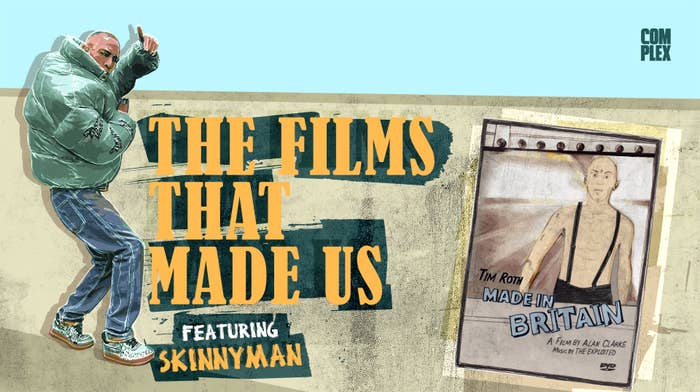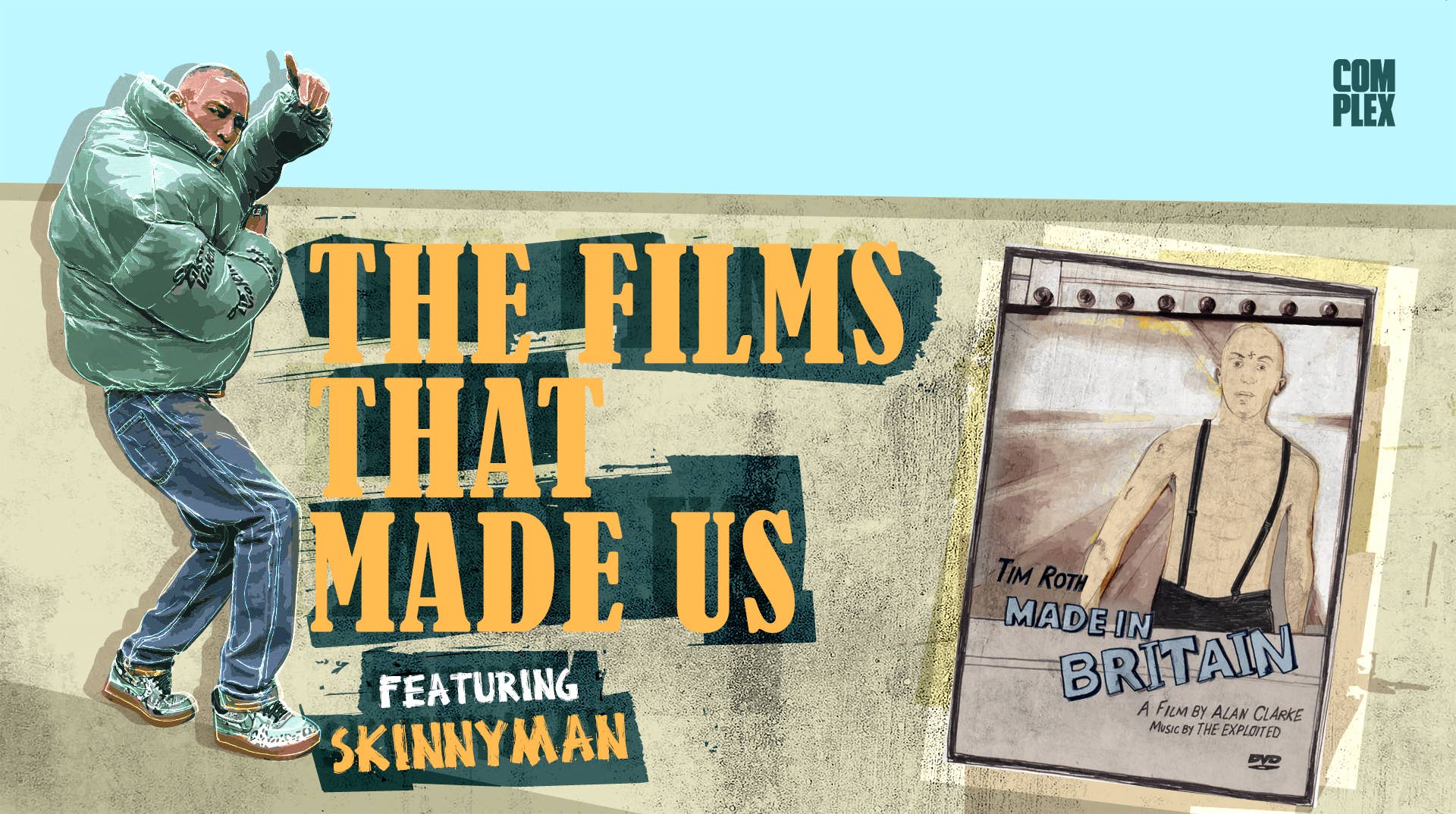
In our new series ‘The Films That Made Us’, we take a look back at the films that have shaped British music over the last three decades. In this first instalment, we speak to UK rap veteran Skinnyman about Alan Clarke’s 1982 film, ‘Made in Britain’, which starred a young Tim Roth and had a profound impact on a generation of musicians.
I first heard about Made in Britain through music.
It never made it to cinemas, aired instead on ITV in 1983, and nearly 40 years later, it’s not on Netflix or Prime or Apple TV. It’s rarely talked about as a touchstone of British film, but if you know your UK sounds, it is everywhere. You probably know it even if you don’t know you know it. Younger readers will have heard one of its most famous scenes on Potter Payper’s Training Day 2 mixtape, Tim Roth’s 16-year-old skinhead Trevor spitting “I hate you for putting me in here” from inside an assessment centre, as sampled on the track “Carpe Diem”. Dubstep fans in the habit of preening the internet for everything Burial samples will have heard Trevor barking, “Well, do it!” seven seconds into “Pirates” on Burial’s self-titled debut album. And if you’re a grime head (like, a proper grime head), you’ll also recognise the same scene—in which Trevor’s trip round the British young offenders’ system is spelled out by a superintendent—from “Trouble” by North London rapper Castro, or CASisDEAD as he’s now known.
As a child of the ‘90s, I learned of the film through listening to the legendary Skinnyman’s debut album, Council Estate Of Mind (2004). Like the film, the Leeds-born, London-raised rapper’s only ever LP is oddly hard to come by, not on streaming services and absent from most critical surveys of the era, but popular enough to break the UK albums chart when it was released and a work of truly phenomenal lyricism. It’s UK hip-hop in its finest form, teeming with social commentary and references to NHS-funded gold teeth, set to boom-bap beats and samples of Sly & The Family Stone. Snippets of dialogue from Made in Britain are sampled throughout Council Estate Of Mind and without even watching, you get a sense of the film—written by David Leland and directed by the great Alan Clarke—from listening to the LP, a true masterpiece.
Trevor is a delinquent, a sweary, glue-sniffing racist, with a swastika tattooed on his forehead, who finds himself in court after throwing a brick through the window of a Pakistani shopkeeper. He spent his school years bunking off, shoplifting and nicking cars—taking and driving away (or touching a dog’s arse, depending on how you interpret the letters TDA). He’s full of hatred and won’t listen to reason, frustrating the education welfare officers (EWOs) who are tasked with getting him back into polite society. It’s explicit, violent and, at times, a difficult watch.
“It’s a difficult watch, but what if you lived it?” Skinnyman says down the phone. “Then it’s a difficult life, right?” He says he watched the film shortly after it came out with a mate who had taped it off the TV, while the two of them were bunking off school. “My favourite scene is the lecture from the social worker, or the education welfare officer.” This is the bit that so many musicians—from rap to dance music—have sampled.
“So, let’s take a look at what life’s got in store for you,” the superintendent tells Trevor, before tracing the kid’s journey from home to school, to bunking off, a visit from the EWO (“at this point, a lot of kids get a bit of sense... but you didn’t listen, did you?”), a letter home, a summons to court, then getting taken down the police station for petty theft, a caution, back to court, a fine, a police attendance centre, then the assessment centre, where he is now. From there, if he doesn’t fix up, he’ll go to a detention centre or a borstal, then—facing little to no job prospects—sign on for the dole, which he’ll spend on food and a place to live. Then, with no cash, he’ll go back to thieving and back to court, then prison, before getting out with no prospects and beginning the cycle again—“round and round you go,” he says.
“He just went through the cycle,” says Skinnyman, “making examples out of every child who wouldn’t adhere to the indoctrination of the curriculum.” It’s worth remembering that while Trevor is a racist thug, Skinnyman is worldly and cosmopolitan. He grew up among West Indians and even refers to the oppression of the British government as “white man lies”. He says he never identified with Trevor, but that his options—or lack thereof—were similar to his own.
Skinnyman was excluded from primary school for disrupting lessons, after being passed between child psychologists, National Union of Teachers and the Inner London Education Authority. Aged just 12, he was sent to HMP Feltham, which at the time was a borstal—a place for offenders under the age of 23—before the borstal system was reformed and Feltham became a young offenders’ institute. Among Feltham’s other alumni are the UK rap stars J Hus, Ghetts, and Digga D. Borstal living conditions were notorious, and controversially portrayed in Alan Clarke’s previous film, Scum—starring a young Ray Winstone—which was first commissioned and then banned by the BBC. Scum is also popular among UK rhymers, with Riko Dan calling it “one of the best British films ever made”.
After Feltham, Skinnyman went to Simmons House and Latchmere House (which gets a mention in Made in Britain), then was in and out of prison throughout his 20s. He was inside when, at 29, he wrote Council Estate Of Mind. Producer Baby J (on the buttons for three tracks on the album) sent him some beats that he could write bars to on a CD disguised as a DMX album from HMV. Having already been through the system, he included clips from Made in Britain as he thought kids listening to the album could benefit from hearing about Trevor’s mishaps. For the rights to use the samples, he and his producers had to pay the BBC by the second; so, to save a bit of money, they edited out the sound of characters breathing between lines.
Not long after his chat with the superintendent, Trevor finds himself stealing a transit van with his roommate, Errol—a Black kid. “It shows you the hypocrisy,” says Skinnyman, “that Trevor, with his white, rightwing, racist idealisms, should find comfort in befriending Errol.” Trevor crashes the van outside a police station, legging it before the feds come out. “Black bastard!” shouts an officer, finding Errol unconscious in the passenger seat. “Racism from police used to be worn on the sleeve. Now it’s gotta be worn on the inside pocket.”
Skinnyman speaks eloquently about how relevant Made in Britain is to this very day, arguing that the rage, racism and social deprivation depicted in the film are now everywhere you look.
“Things have changed,” he says. “Violent crime has increased, robbery has increased, murder has increased, rape and sexual assault has increased, poverty has increased, unemployment has increased, prison numbers have increased, the consumption of drugs has increased.” He keeps going: food camps, cashless society, tuition fees, the monarchy, “white Jesus”, Sarah Everard, Cressida Dick, Boris Johnson’s lockdown parties, police taking selfies with dead bodies—and “poisonous vaccines”.
It’s hard to imagine Trevor taking kindly to a COVID-19 vaccine, and it’s perhaps this that makes Made in Britain as powerful now as it was in 1982. More than anything else, Trevor symbolises a generation’s alienation from mainstream society and absolute distrust of the establishment. Its existential ruminations chimed with a generation of musicians and its influence lives on subtly in UK film and television; in this year’s season of Top Boy on Netflix, notice how the rebellious, parentless Tia meets with a social worker before nicking his car, just like Trevor in Made in Britain.
A similar separation between the ruling class and the masses endures today, manifested in the many people refusing to take the vaccine, people who—like Trevor, like Skinnyman—were made in Britain. Skinny summarises: “That speech, about ‘round and round you go’, is more apparent in today’s society than it was back then.”




